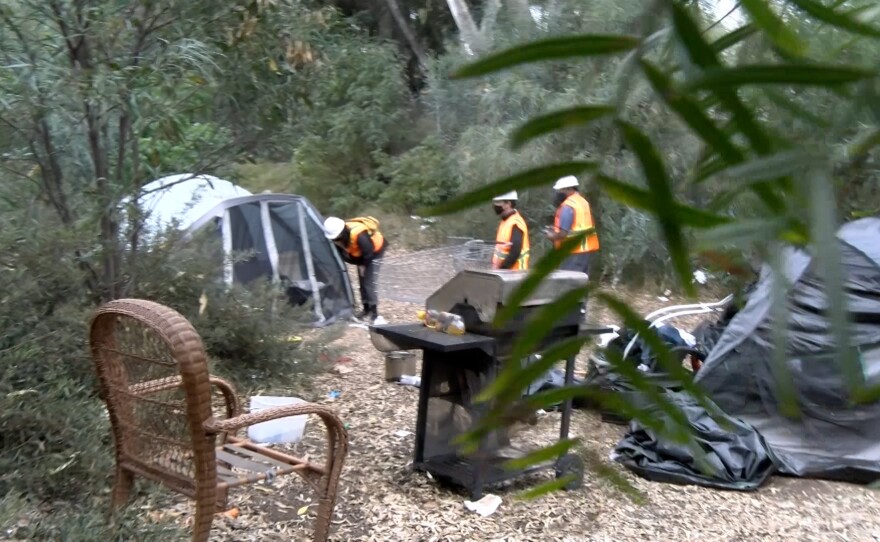Caltrans and the city of San Diego are partnering up to help unsheltered people living along the state’s highways.
Funding is coming from California Governor Gavin Newsom’s $22 billion dollar California Comeback Plan that aims to address homelessness and the lack of affordable housing in the state.
As of 2020, point in time counts conducted by the Regional Task Force on Homelessness, found there were an estimated 7,619 people living without a home in San Diego County with 4,870 in the City of San Diego.

Many of the homeless have taken shelter near state highways.
RELATED: San Diego County's homeless count pushed to February
Caltrans hopes to eventually clear these dangerous areas where homeless people are camping out. Transportation officials don't just want to clear people out without having somewhere for them to go.
San Diego city officials hired the City Net Homeless Outreach team to help the hundreds of homeless living in these areas.
Caltrans meets with City Net daily and escorts the social workers to encampments across San Diego.
An area is not cleared out until City Net has had sufficient time to get people into shelters.
During a ride-along with KPBS, case manager Karyn Garner stopped at an encampment near downtown San Diego.
“One of the spots that we’re going to first is G street and 17th,” Garner said.
Garner and a team of four other staff members in hard hats, carried snack packs and iPads ready to offer help to people.
The crews made their way through a hole in a chain-link fence to get to a camp that sits on a hillside above interstate five in downtown San Diego.
Six makeshift tents are pitched here, all are homes belonging to someone.
"Hi, City Net homeless outreach is anyone home?" Garner said as she peered into a tent.
A pair of City Net staffers visited each tent, hoping someone was home and ready to receive help.
Garner said this is their third time visiting this encampment.
“So, this area in itself is shelter resistant, but we come and work with them and see what we can do for them,” she said.
One homeless man accepted a snack pack but was not ready to go to a shelter.
"But that’s okay," Garner said. "Today’s no could be tomorrow’s yes."
She said that’s the beauty of their program.
Workers continually engage with people living on the street and build a rapport with them until they are finally willing to accept help.
“We find 80 to 85 percent of the folks are very interested. They’re just saying please help us to navigate the system. We would very much not like to live on the side of the freeway,” said Brad Fheeildhouse, City Net executive director.
For some encampments, it may take weeks before individuals accept City Net’s help.
“We’re here to make sure that these clients know that we value them and we’re here to help in any aspect that we can,” Garner said.
Since the team started working in San Diego they’ve engaged more than 460 homeless people.
More than 100 have accepted help which includes case management and connecting with behavioral health services.
However, only eleven people have been successfully placed in shelters.
RELATED: Homeless camps are often blamed for crime but experts say it's not so simple
Garner said it can be disappointing when a person doesn't want to accept help.
“They have to be ready to make the change and to get off the streets,” she said.
Katherine was camping in a canyon along the 805 South when City Net first outreached to her.
After a decade of living on and off the streets, she was finally ready for some stability.
“I’m doing it for my daughter and my grandson too,” she said.
Katherine has two pups she wasn’t willing to leave behind. Fortunately, she found a shelter that took all three of them in.
“And it happened at the last moment like they were saying, No, we don't have a spot and at the last moment, they said yes. So I knew it was a God thing,” she said.
She walks her dogs every morning and visits her friends that live near her shelter.
She said the transition hasn’t been easy. She grew accustomed to living on the streets and was nervous about going to a shelter.
“I'm determined they’re worth it and my family's worth it, and I’m worth it,” she said.
Garner said seeing people like Katherine make a positive change is what it’s all about.
“So being able to see her and get that follow up from her, makes this job even better, it encourages us just to keep on going,” Garner said.
The city will evaluate the program's success rate in June and decide if the contract will be extended.





